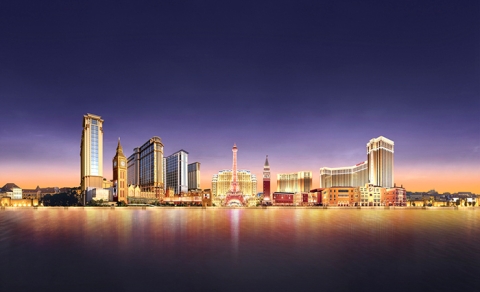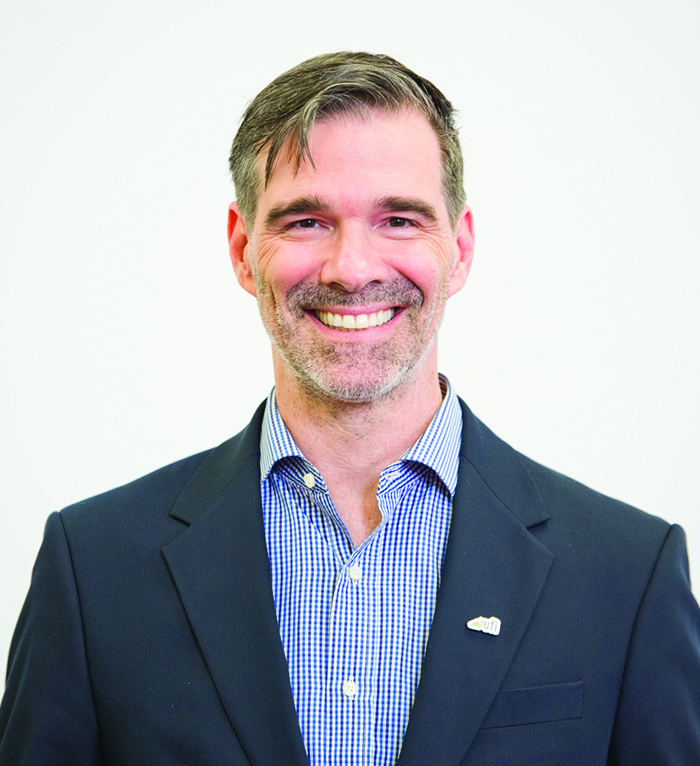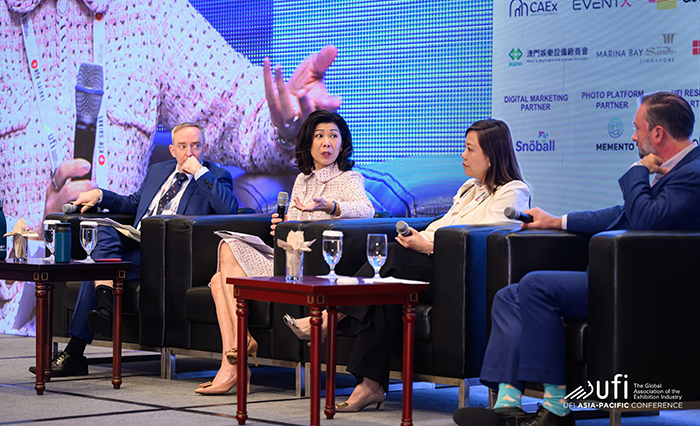What’s Trending in Exhibitions in Asia-Pacific: Q&A With UFI’s Mark Cochrane

What’s the state of the exhibition industry in the Asia-Pacific region? In a TSNN exclusive, we interviewed Mark Cochrane, regional director of Asia-Pacific for UFI, the Global Association of the Exhibition Industry, to get the scoop on the annual in-person Regional Conference held March 7-8 at the Parisian Macao (pictured).
Serving in his role for nearly 14 years, Cochrane shared his insider’s view on what’s trending in the region for exhibitions. Here are excerpts from our conversation. Watch or listen to the full interview here.
- Regional outlook: It’s almost universally optimistic news, but the two headlines: India and China. That's a big chunk of the market, like 75%.
- COVID-19 bounceback: COVID restrictions were a reality for many markets in Asia at the beginning of last year, so it doesn't feel like ancient history to us. That's why last year was sort of getting our legs back, and this year is back to growth.
- India in growth mode: It's easy to start with India as the growth story. The Indian exhibition market is underdeveloped. It's been held back for a lot of years because there weren't enough venues to support the shows that organizers wanted to launch. Now we have a number of new venues in India, so that's unlocking a lot of growth for the industry in India. In general, the Indian economy is really on fire. It's the fastest growing economy in Asia, and it could be a growth story that could run for a while. China has been a 20-year growth story in terms of the overall economy, and now it could be India's turn to shine. I think people are really excited about it, so I put that as the No. 1 headline from Asia. (In fact, India’s poised for about 8% growth this year, that makes India easily the fastest growing economy in the world, according to CNBC.
Related: UFI Global Exhibition Barometer Reveals Industry Is Poised for Robust Growth in 2024

- China factor: There's a lot of news coverage on the Chinese economy slowing down, but it's all relative. The GDP growth in China is still going to be higher than most Western developed countries (In fact, The International Monetary Fund projects China's 2024 growth at 4.6%, according to Reuters.). China accounts for more than 60% of net space sold in Asia, so it is super-important. It sets the tone for the whole exhibition industry in Asia. Is it slower? Yes. Different than before COVID? Maybe a little bit more domestically focused because geopolitics are playing a part in that, as well. But overall, if you look at international organizers that have huge portfolios in China — RX and Informa would be the biggest — I think they're really happy with how their events are doing, especially in the major exhibition cities.
- Challenges: Rising costs. Most of the events here, especially the bigger ones, are going to have a significant international component. So that means higher costs in terms of flight, accommodations and getting goods in and out of market. All of those factors are raising the cost for exhibitors to participate in events. That means there's going to be a little bit of a flight to quality. You've got second-, third- and even fourth-tier cities in China, and there are lots of shows in those markets I think are going to be struggling compared to the tier-one cities. The four key cities in China for the exhibition market are Beijing, Shanghai, Shenzhen and Guangzhou. That's 80% of the market right there, so the leading shows in those markets will do better, I think, because people will be willing to spend to be at those events.

Related: Watch videos from the 2024 UFI Asia-Pacific Regional Conference Day 1, Day 2, Full Event Recap
- Four years in the making: This Asia Pacific conference was a special one because we had planned to go to Macau in February 2020. It took us four years to do it at this location. It might sound crazy that we had to wait that long, but the way COVID was handled in some countries in Asia was very different from the U.S. A lot of markets — China, Hong Kong, Macau and Taiwan — didn't open for business again until January 2023. We didn't go to Macau last year because they weren't open in time to host it for 2023. We went to Kuala Lumpur in Malaysia. Southeast Asia moved a little faster than China in terms of opening for business and removing restrictions.
- Meeting vibe: We had almost 300 delegates from 20 countries and regions around Asia to the Parisian Macau, the Las Vegas of Asia. We had great content, but what I felt more than anything was just the excitement to get back to networking. [There were] lots of people who hadn't seen each other in years. We had a lot of first-timers, as well.
- Co-located launch of Event Directors Summit: We had some new features at the event, like the Event Directors Summit, which we launched in Maastricht last year at the European Conference. It's a half-day seminar. Usually at UFI conferences, we tend to get the regional directors and general managers, but we wanted to engage the people responsible for organizing the event. We had 20 event directors responsible for a wide range of exhibitions from different markets.
- Experience to remember: We had an ice breaking event at the skywalk around Macau Tower, which is 230 meters in the air.
- Session standout: My favorite session was Mark Harper from Swire, a Hong Kong -based conglomerate. They own everything from airlines to food and beverage. They own Cathay Pacific, the flagship airline for Hong Kong, property developments in Hong Kong and China, and the rights for Coca Cola bottling in Hong Kong and other markets. What I liked about Mark's session: He was focused on sustainability. There were a lot of lessons for our industry. If we try hard enough, it's achievable.
What’s next: The UFI Asia-Pacific Regional Conference will be held in Australia for the first time when it runs in Melbourne in mid-March 2025. The full calendar of UFI events can be found here.
Don’t miss any event-related news: Sign up for our weekly e-newsletter HERE, listen to our latest podcast HERE and engage with us on LinkedIn!


Add new comment